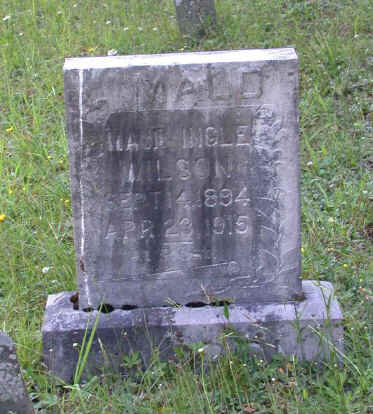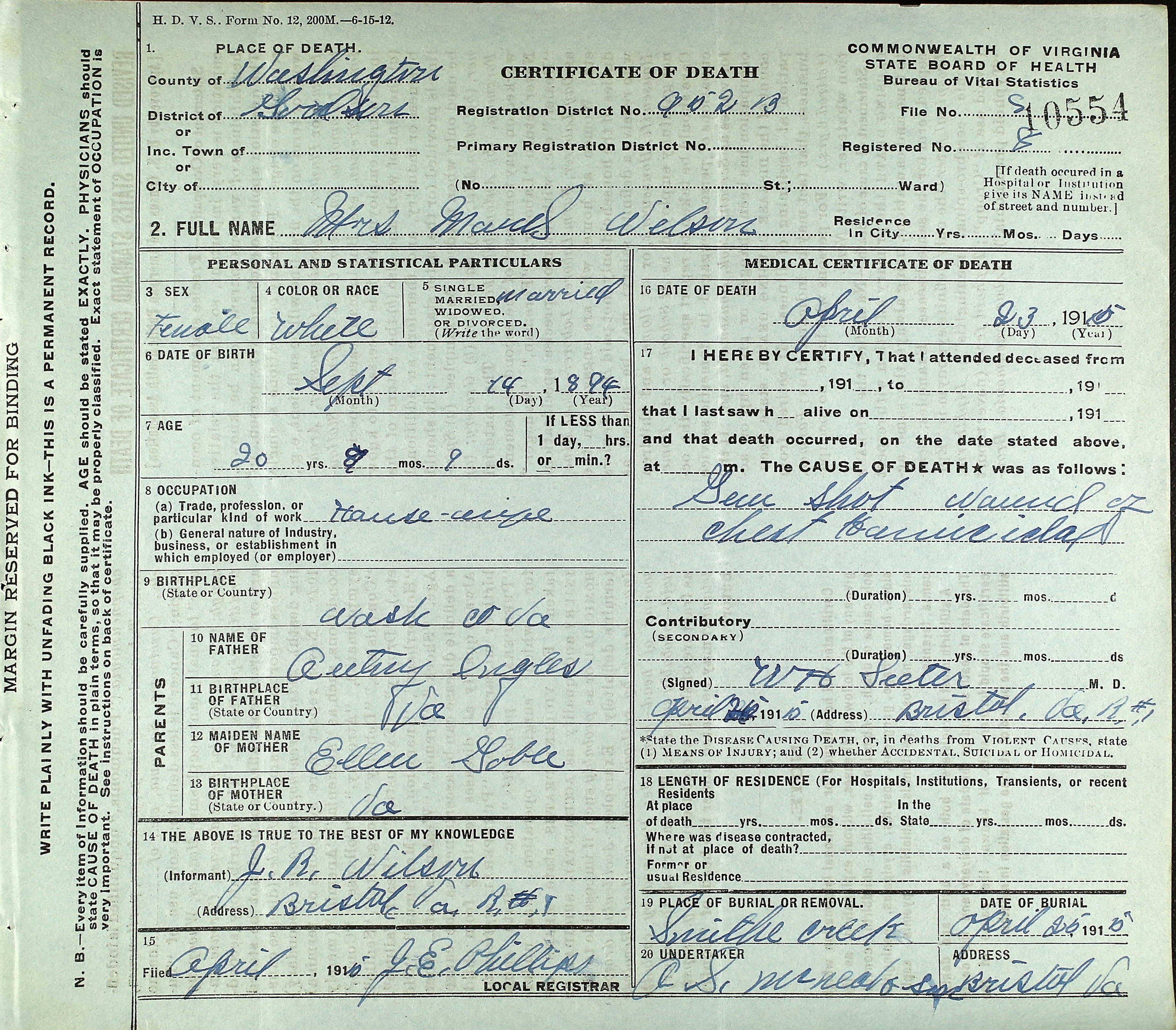At 2 p.m. on Friday, April 23, 1915, James Rufus Wilson departed on a trip on which he was to spend the night and the next day. He left his attractive 20-year-old wife, Mrs. Maude Wilson, at their home on the Abingdon Highway, two miles east of Bristol. He told her to go to the home of an acquaintance and spend the night.
Early the next afternoon, Saturday, April 24, 1915, Edwin Wilson, father-in-law of Mrs. Maude Wilson, went to his son's home and, receiving no answer to a knock on the door, entered the house. Walking into the bedroom, he saw the body of his daughter-in-law lying on the floor in a pool of blood. Most of her clothing had been torn from her body.
The body of Mrs. Wilson, who had been dead some 18 to 24 hours, was lying on its right side. Her hands were tied and bound to the foot of the bed. A red bandana and pieces of her clothing were tied about her mouth and face, as if to gag and blindfold her. A medical examination was to show she had been criminally assaulted, then killed with the blast of a shotgun held within a few inches of her body near the under pit of her left arm.
When officers arrived at the scene to conduct an investigation, Jim Canter, known to have been employed on the Wilson farm some time before, was summoned as a witness from his nearby home. At about this time, a pair of blood-stained overalls was found in the Carter barn. Jim Carter admitted they were his overalls, but he said he could not explain the blood stains other than he had frequent nosebleeds. Though denying any knowledge of the killing of Mrs. Wilson, he was arrested and charged with murder.
At this time, officers thought Luther Canter was hiding in distance parts, as a fugitive wanted on a charge of having criminally assaulted another married woman in the same area several months before. This woman died of pneumonia shortly after being assaulted. However, Luther had returned to the neighborhood several days before the killing of Mrs. Wilson and spent most of the time hiding in a cave near his home.
On Sunday afternoon, two days after the brutal killing of Mrs. Wilson, Sam P. and W.J. LeGard, prominent farmers of the Abingdon Highway area, went to the Canter home in search of a shotgun missing from the Wilson home. It had been taken from its rack on the bedroom door.
Mrs. John Canter met the LeGards near her home and said Luther Canter wanted to confess to the killing of Mrs. Wilson in return for the freedom of her younger son, Jim Canter, who, she declared in tears, was innocent of the crime.
Luther said he used the shotgun taken from the door rack of the Wilson bedroom to kill Mrs. Wilson. He showed where the weapon was hidden in a heap of newly-raked leaves. He told the LeGrad brothers he alone was responsible for the crime.
When Luther Canter indicated he intended to escape before the arrival of officers, Sam LeGard grabbed him by one arm and W.J. Legard held him by the other arm. They took him to the home of Dr. W.H. Teeter and, fearing mob violence and possibly a lynching, as a result of a strong upsurge of feelings against the Canters, they kept him hidden until nightfall. In the dark of the night officers took him to the Smith County jail in Marion and soon thereafter the Canter brothers were taken to Roanoke jail for safekeeping until their trial.
On the day of the trial, the prisoners were brought from Roanoke under heavy guard. Deputies armed with rifles escorted them to the courthouse. Throughout the trial, 100 armed guards were stationed at strategic points inside and around the courthouse.
When Luther Canter was arraigned before Judge Preston W. Campbell, he entered a guilty plea and within an hour was sentenced to die in the electric chair. Jim Canter was placed on trial immediately.
Luther Canter testified that he went to the Wilson home on a "social call" and that when Mrs. Wilson screamed when he entered her bedroom, he grabbed her, gagged and tied her to the bedpost and committed the crime of rape and murder. He said he took the shotgun with him, intending to kill Mrs. Wilson's husband if he met him while fleeing from the scene of the crime.
He said he told his brother, Jim Canter, the day before the murder was committed, that he was going to leave the area on a freight that day, and that the younger Canter neither knew he remained in the neighborhood nor had knowledge of the crime.
Admitted into the trial record were numerous bits of circumstantial evidence against Jim Canter. These included a statement that it would have been difficult for a man of such small stature as Luther Canter to have committed the crime against Mrs. Wilson by himself.
Jim Canter and his attorney both contended the strong public sentiment aroused over the brutality of the murder was a powerful influence over the jury, a contention in which the Court of Appeals concurred.
Contributor: SELLS (47719511)
At 2 p.m. on Friday, April 23, 1915, James Rufus Wilson departed on a trip on which he was to spend the night and the next day. He left his attractive 20-year-old wife, Mrs. Maude Wilson, at their home on the Abingdon Highway, two miles east of Bristol. He told her to go to the home of an acquaintance and spend the night.
Early the next afternoon, Saturday, April 24, 1915, Edwin Wilson, father-in-law of Mrs. Maude Wilson, went to his son's home and, receiving no answer to a knock on the door, entered the house. Walking into the bedroom, he saw the body of his daughter-in-law lying on the floor in a pool of blood. Most of her clothing had been torn from her body.
The body of Mrs. Wilson, who had been dead some 18 to 24 hours, was lying on its right side. Her hands were tied and bound to the foot of the bed. A red bandana and pieces of her clothing were tied about her mouth and face, as if to gag and blindfold her. A medical examination was to show she had been criminally assaulted, then killed with the blast of a shotgun held within a few inches of her body near the under pit of her left arm.
When officers arrived at the scene to conduct an investigation, Jim Canter, known to have been employed on the Wilson farm some time before, was summoned as a witness from his nearby home. At about this time, a pair of blood-stained overalls was found in the Carter barn. Jim Carter admitted they were his overalls, but he said he could not explain the blood stains other than he had frequent nosebleeds. Though denying any knowledge of the killing of Mrs. Wilson, he was arrested and charged with murder.
At this time, officers thought Luther Canter was hiding in distance parts, as a fugitive wanted on a charge of having criminally assaulted another married woman in the same area several months before. This woman died of pneumonia shortly after being assaulted. However, Luther had returned to the neighborhood several days before the killing of Mrs. Wilson and spent most of the time hiding in a cave near his home.
On Sunday afternoon, two days after the brutal killing of Mrs. Wilson, Sam P. and W.J. LeGard, prominent farmers of the Abingdon Highway area, went to the Canter home in search of a shotgun missing from the Wilson home. It had been taken from its rack on the bedroom door.
Mrs. John Canter met the LeGards near her home and said Luther Canter wanted to confess to the killing of Mrs. Wilson in return for the freedom of her younger son, Jim Canter, who, she declared in tears, was innocent of the crime.
Luther said he used the shotgun taken from the door rack of the Wilson bedroom to kill Mrs. Wilson. He showed where the weapon was hidden in a heap of newly-raked leaves. He told the LeGrad brothers he alone was responsible for the crime.
When Luther Canter indicated he intended to escape before the arrival of officers, Sam LeGard grabbed him by one arm and W.J. Legard held him by the other arm. They took him to the home of Dr. W.H. Teeter and, fearing mob violence and possibly a lynching, as a result of a strong upsurge of feelings against the Canters, they kept him hidden until nightfall. In the dark of the night officers took him to the Smith County jail in Marion and soon thereafter the Canter brothers were taken to Roanoke jail for safekeeping until their trial.
On the day of the trial, the prisoners were brought from Roanoke under heavy guard. Deputies armed with rifles escorted them to the courthouse. Throughout the trial, 100 armed guards were stationed at strategic points inside and around the courthouse.
When Luther Canter was arraigned before Judge Preston W. Campbell, he entered a guilty plea and within an hour was sentenced to die in the electric chair. Jim Canter was placed on trial immediately.
Luther Canter testified that he went to the Wilson home on a "social call" and that when Mrs. Wilson screamed when he entered her bedroom, he grabbed her, gagged and tied her to the bedpost and committed the crime of rape and murder. He said he took the shotgun with him, intending to kill Mrs. Wilson's husband if he met him while fleeing from the scene of the crime.
He said he told his brother, Jim Canter, the day before the murder was committed, that he was going to leave the area on a freight that day, and that the younger Canter neither knew he remained in the neighborhood nor had knowledge of the crime.
Admitted into the trial record were numerous bits of circumstantial evidence against Jim Canter. These included a statement that it would have been difficult for a man of such small stature as Luther Canter to have committed the crime against Mrs. Wilson by himself.
Jim Canter and his attorney both contended the strong public sentiment aroused over the brutality of the murder was a powerful influence over the jury, a contention in which the Court of Appeals concurred.
Contributor: SELLS (47719511)
Family Members
Sponsored by Ancestry
Advertisement
Records on Ancestry
Advertisement













